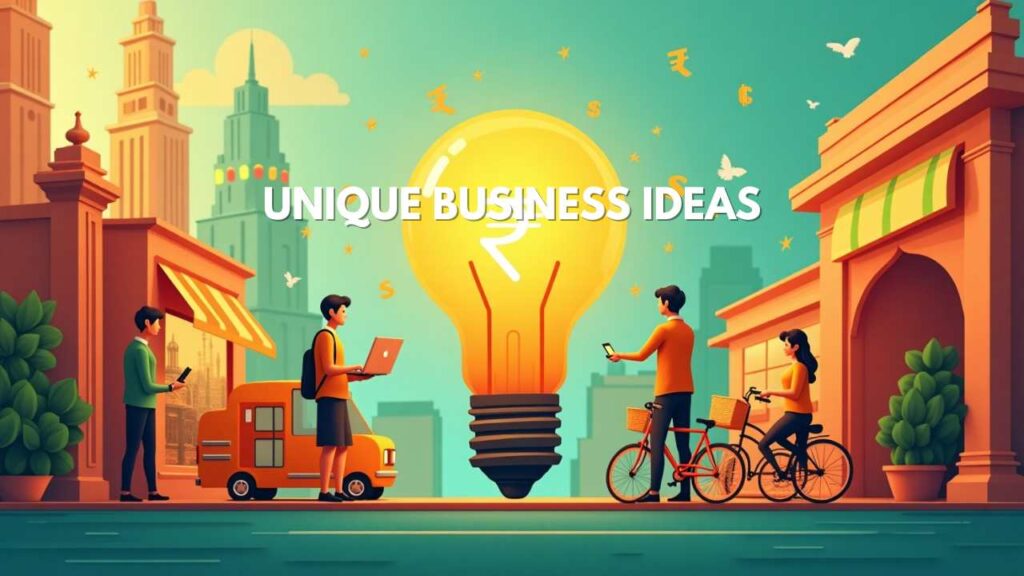The Indian entrepreneurial landscape has witnessed unprecedented growth, with visionary business leaders actively seeking business ideas that leverage cutting-edge technologies including artificial intelligence, augmented reality, and intelligent automation. These business ideas not only demonstrate how to capitalize on global innovations but also showcase methods to adapt them to India’s diverse market requirements while building sustainable competitive advantages.
Modern entrepreneurs are moving beyond conventional approaches, exploring business ideas that combine profitability with meaningful purpose. Many of these unique ideas can be started as online businesses. From AI-powered solutions to sustainability-focused ventures, the spectrum of business ideas available in India is remarkably diverse, spanning multiple industries with distinct advantages and growth possibilities.
This comprehensive guide presents the most promising unique business ideas in India for 2025 investment, complete with implementation strategies, revenue projections, and market dynamics. Whether you’re a newcomer to entrepreneurship or an experienced business professional seeking diversification opportunities, these business ideas represent the future of Indian commerce and innovation.
Why 2025 is the Optimal Time to Launch a Unique Business Idea
- High-level Digital Infrastructure: India has a well-developed digital system, including high internet access and convenient digital payment systems, which provide an optimal background to realize unique businesses using technologies.
- Progressive Government programs: The government has launched strategic programs, such as Startup India, Digital India, and Atmanirbhar Bharat, which help entrepreneurs financially, provide tax relief, and simplify regulatory processes to implement their new business ideas.
- Market Transformation in the Post-Pandemic World: Consumer demand now remains firmly in the digital-first world, so the demand for new services at the cutting edge and unique business concepts that can meet changing lifestyle trends is enormous.
- International Access: E-commerce and digital marketing have made international accessibility democratic whereby even small scale unique business ideas can access international customers on the first day of launching.
Essential Trends Influencing Unique Business Ideas
- AI and Automation Revolution: The world is going AI and automated, and it is opening up niche business opportunities in the form of specialized markets and business ideas to provide AI-solutions and services.
- Sustainability Imperative: Consumer behavior is being motivated by environmental awareness which is why eco-friendly and sustainable unique business ideas are becoming more appealing both to customers and investors.
- Mass Personalization: Modern consumers are highly personalization-driven, and it leaves room to pursue special business ideas engaged with data analysis and machine learning to make the experience more personalized.
- Remote-Centric Economy: The long-term transition to remote work and online cooperation has created new dimensions of the market with its niche business ideas that support remote teams and digital nomads.
Leading Unique Business Ideas in India for 2025
1. AI-Powered Tools & Intelligent Automation

Artificial intelligence technologies are transforming the way businesses are conducted, including chatbots that service customers and predictive analytics systems. Enterprise AI powered by cloud has become affordable to small businesses, and they can use it to automate repetitive processes, make data-informed decisions, and provide customized customer experiences. This democratization implies that individual entrepreneurs can use machine learning, natural language processing and computer vision to achieve competitive edges. This original business concept includes such aspects as AI writing assistants and automated inventory management.
- Revenue generation: AI algorithm licensing, providing the services to businesses by use of AI with a subscription-based SaaS model or by selling AI-generated services to businesses.
- Required resources: AI/ML technical talent, cloud computing infrastructure, and startup capital of software development.
- Income potential: Earnings can range between 50K and 5M+ per year depending on reach and the sophistication of solution.
- Launch strategy: At first, focus on particular niche painpoints, cooperate with the AI experts, and focus on simplified interfaces rather than extensive functionality.
2. Sustainable & Environmental Ventures

The trend towards environmental sustainability has become a demand driven by consumer need, regulatory need and real environmental need. Green sustainable business ideas cover renewable energy, sustainable packaging, circular economy, and green technology. Businesses which are able to develop strong brands have market opportunities because consumers are increasingly preferring to purchase products of companies that share their environmental values. Green unique business ideas are even further enhanced by carbon credits and government incentives.
- Revenue generation: Direct sales of eco-products, environmental solvency consulting, trading in carbon write-offs and environmental approvals.
- Required resources: Environmental regulations expertise, green supply chain, and, as a rule, increased early investment on green materials.
- Income potential: 25K-2M+ a year with much more growth that can be achieved with market development.
- Launch strategy: Gather information on local environmental regulations, acquire specific certificates on the environment and make the issue of environmental impact open to customers.
3. Health, Wellness & Longevity Solutions

The health and wellness market is rising like a firecracker with people becoming more conscious about physical and mental health. The category of this unique business idea consists of telemedicine companies, mental health applications, customized diet, physical exercise technology, and longevity research tools. The geriatric population and health awareness lead to long-term demand for new solutions. Healthcare services are also being radically altered by wearable device integration, AI-enhanced monitoring and preventive care models.
- Revenue generation: Customer subscriptions to a health app, working directly with patients within wellness activities, or collaboration with healthcare organizations and health insurance.
- Required resources: Healthcare experience or collaborations, regulatory requirements understanding, and digital health solutions technology.
- Income potential: it is promising between 30K -10M + per year, with prosperous digital health companies receiving enormous evaluations.
- Launch strategy: Become sufficiently compliant with the regulations at the first stages, take an idea of evidence-based solutions, consider working with the existing healthcare providers.
4. Advanced Mobility & Delivery Solutions (EVs, Drones)

The high rates of urbanization, environmental awareness, and the need to have more rapid and efficient logistics are some of the reasons why the transport and delivery technology is changing at such a fast rate. The main development opportunities of this unusual business concept lie in the electric vehicle infrastructure, autonomous delivery system, drone usage, and micro-mobility service. Logistics companies are at the forefront of this evolution, leveraging the combination of IoT, AI and enhanced battery technology is creating new business models of last-mile delivery, personal transportation and logistics optimization. The international smart city initiatives are developing an enabling environment through mobility innovation.
- Revenue generation: Charging fees on experience or selling virtual products; advertising in the virtual environment or renting AR/VR to other companies.
- Required resources: the competency in the development of VR/AR, (b) skill in the production of top-quality content, and (c) special hardware or software platforms.
- Income potential: 25K-3M+ a year as the market matures, and the hardware becomes more available.
- Launch strategy: Start with basic AR applications, concentrate more on user experience rather than the technical sophistication and collaborate with content creators or retailers.
5. Smart Home & IoT Solutions

The Internet of Things is still growing in homes, and there is room to make them smarter and more convenient, thus more secure and energy-efficient. Advanced connectivity, smart home technology, and smart gadgets, and unified platforms are no longer the luxury of the wealthy but what the consumer wants. With the integration of AI and machine learning, it is possible to conduct predictive maintenance, automate optimization and customize home environments. The interoperability issues between smart home ecosystems are a source of problems as well as opportunities that can be solved creatively, and thus it is an interesting unique business concept.
- Revenue generation: The sale of hardware, the sale of monitoring and automation subscription services, or contracts to install and maintain services.
- Required resources: Ability to develop products, knowledge of the IoT protocol, supply chain, and customer support infrastructure.
- Income potential: $40K-$5M+ a year according to product complexity and market penetration.
- Launch strategy: Pay attention to resolving particular pain points, make the installation, and setup process as easy as possible, and focus on data security and privacy.
6. AR/VR Travel & Virtual Commerce
AR and VR technologies are developing a sense of immersion by way of mixing digital and physical. The mainstreaming of virtual traveling, augmented reality shopping, virtual storefronts, and immersive entertainment platforms are on the rise. The novel business concept enables the customers to have an experience of the products, destinations or services before they spend their precious time and money on the purchase that might not satisfy them. Companies are able to offer worldwide access without the need to have physical stores and the customers get a richer experience in terms of interactivity and good detail at the comfort of their own homes.
- Revenue generation: Charging fees on experience or selling virtual products; advertising in the virtual environment or renting AR/VR to other companies.
- Required resources: (a) the competency in the development of VR/AR, (b) skill in the production of top-quality content, and (c) special hardware or software platforms.
- Income potential: 25K-3M+ a year as the market matures, and the hardware becomes more available.
- Launch strategy: Start with basic AR applications, concentrate more on user experience rather than the technical sophistication and collaborate with content creators or retailers.
7. Ghost Kitchens & Print-On-Demand Services

Ghost kitchens and print-on-demand are examples of asset-light special business concepts that have low overhead expenses and high penetration. Ghost kitchens do not involve traditional dining areas; instead, their operations are completely online with delivery being done by online platforms. The POD process removes the inventory risk because its printing starts once the order is received. The two models use digital marketing and e-commerce to access the consumers directly, and they can be scaled without adding equivalent infrastructure and inventory investment.
- Revenue generation: Direct sales with higher margins due to reduced overhead, multiple revenue streams through various platforms and products.
- Required resources: Minimal physical space, digital marketing skills, platform partnerships, and quality control systems for consistent output.
- Income potential: $30K-$1M+ annually with potential for rapid scaling across multiple locations or product lines.
- Launch strategy: Master one platform before expanding, focus on quality and consistency, and leverage data analytics to optimize operations.
8. Curated Subscription Services

The subscription box business model has transformed to an experience curation platform that is centered in discovery, convenience and personalization. Effective subscription services are engaged with glancing at a niche, sophisticated curation, and congregation in common interests or requirements. Recurring revenue ensures consistent cash flow, while subscriber data allows for ongoing improvement and personalization. This is a unique business idea that can scale up due to the social media and influencer marketing integration to drive reach and brand awareness.
- Revenue generation: Monthly or quarterly subscription fees with margins from bulk purchasing and exclusive supplier partnerships.
- Required resources: Curation expertise, supplier relationships, fulfillment infrastructure, and strong marketing and customer retention strategies.
- Income potential: $50K-$2M+ annually with successful boxes achieving significant subscriber bases and high lifetime value.
- Launch strategy: Choose a passionate niche audience, focus on unique products not easily found elsewhere, and invest heavily in customer experience.
9. Digital Heritage & Legacy Preservation

Digital legacy and memory preservation services are in response to the emerging need to sort, maintain and distribute digital memories and valuable information between generations. The services allow individuals and families to create digital time capsules, digital organization of photos and videos, family history capturing and preserving essential information and making it available to future generations. The emotional attachment to the product and objectiveness of need result in a high level of the customer loyalty and word-of-mouth marketing chances, and it is a significant unique business idea. As people increasingly value memory preservation in a digital age, this stands out among the most emotionally resonant unique business ideas in India, offering both sentimental value and long-term utility.
- Revenue generation: One-time service fees, annual storage subscriptions, or premium features for enhanced organization and sharing capabilities.
- Required resources: Digital storage infrastructure, user-friendly software development, and marketing that emphasizes emotional and practical benefits.
- Income potential: $20K-$500K+ annually with growth potential as digital natives age and create more digital content.
- Launch strategy: Emphasize security and privacy, create intuitive user interfaces, and develop partnerships with funeral homes or estate planning attorneys.
10. Specialized E-Commerce & Subscription Models

Niche online shops serving particular communities, interests, or needs survive even the Amazon dominance. The key to its success is an in-depth comprehension of niche audiences, superior product curation, professional recommendations, and community construction. The subscription elements will make revenue predictable and will raise customer lifetime value. It is a tried and tested unique business idea model as these businesses usually become media brands, uniting the enthusiasts, educating and having access to exclusive specialized products or services.
- Revenue generation: Product sales with higher margins due to specialization, subscription fees for exclusive access or regular deliveries.
- Required resources: Deep niche knowledge, supplier relationships, e-commerce platform setup, and community building and content marketing skills.
- Income potential: $25K-$1M+ annually depending on niche size and customer engagement levels.
- Launch strategy: Become genuinely passionate about your niche, provide exceptional customer service, and build community around shared interests.
11. Social Commerce for Micro-Brands

Social commerce allows small brands to sell in social media without the need of a conventional e-commerce site. It is a very distinct business concept that exploits the power of social proof, influencer collaboration, and user-generated content to generate sales in social contexts. Micro-brands are able to establish genuine customer connections, can react to trends promptly and can develop personalized experiences which bigger brands cannot match.
Friction between discovery and purchase is minimized through integration with messaging apps, live shopping and social media storefronts. This model is rapidly gaining momentum as one of the unique business ideas in India, especially among digital-first entrepreneurs and local sellers looking to scale without heavy infrastructure.
- Revenue generation: Direct product sales through social platforms, influencer partnership commissions, or social commerce technology licensing.
- Required resources: Social media expertise, influencer network development, product sourcing or creation, and customer service through social channels.
- Income potential: $15K-$800K+ annually with viral potential for exceptional products or marketing campaigns.
- Launch strategy: Choose platforms where your audience is most active, invest in high-quality visual content, and engage authentically with your community.
12. Robotics-as-a-Service (Security, Cleaning, Agriculture)

Robotics service models grant high levels of automation to organisations that do not have the economic capacity to purchase highly expensive robots. Robots are purchased and serviced by service providers and the usage fee charged to the customer provides predictable revenue and decreases customer risk. These can be used in security patrol robots, automated cleaning systems, agricultural robots and warehouse automation.
The model can allow the adoption of robotics in any industry instantly without involving the end-users who are supposed to offer technical expertise, which makes it a novel business concept. This approach is gaining traction as one of the unique business ideas in India, offering scalable solutions across industries without heavy upfront investment.
- Revenue generation: Monthly or hourly service fees, maintenance contracts, or performance-based pricing tied to efficiency improvements.
- Required resources: Significant capital for robot acquisition, technical maintenance capabilities, insurance coverage, and industry-specific expertise.
- Income potential: $100K-$5M+ annually depending on robot types and market penetration.
- Launch strategy: Focus on one specific application, develop strong maintenance capabilities, and create clear ROI demonstrations for potential clients.
13. Drone Delivery & Infrastructure Services

Drones and the accompanying infrastructure are the future of logistics and delivery. In addition to the delivery of packages, drones are used in medical supply delivery, land surveying, inspection of infrastructures, and emergency response. The supportive ecosystem consists of drone maintenance, pilot training, regulatory compliance service and route optimization software. With regulatory models becoming more stable, it is becoming easier to see ways in which this innovative business concept will be able to become commercially viable.
- Revenue generation: Delivery service fees, infrastructure maintenance contracts, pilot training and certification services or drone fleet management software.
- Required resources: Professional skills in drone technology, knowledge of regulations, effective insurance, and pilot training courses.
- Income potential: 75K-10M+ yearly as the regulations allow broader commercial use.
- Launch strategy: Learn the nuances of the regulatory framework in detail, start with specific applications such as medical delivery, and build powerful safety standards.
14. Personalized Fashion & Custom Accessories

Personalized fashion takes advantage of technology to produce customized clothes and accessories to a particular client. Body scanning, personalized design tools, and on-demand manufacturing, via mass customization using 3D body scanning, AI-driven design tools, and on-demand manufacturing, allow the creation of tailor-made, personally unique products that are optimally fit.
This special business concept will minimize wastage since the items will be produced on order and also sell at high prices due to customization. It’s one of the most promising unique business ideas in India, especially for entrepreneurs looking to combine tech with creativity in the fashion industry.
- Revenue generation: High prices on the individualised products, custom design services or license of the technology to other fashion houses.
- Required resources: Designing capabilities, manufacturing relations or facilities, customization technology, and customer measurement systems.
- Income potential: up to 2M and more per annum as luxury personalized products will have huge markups.
- Launch strategy: Target individual product categories, spend in proper sizing technology and recruit the special value of customization.
15. “Creative Chaos” Customization for Gen Z Markets

Gen Z shoppers accept the appearance of unrelated sets, surprising arrangements, and deliberate ugliness that other generations would view as messy and off-putting. This is in fashion, digital items and general product design and gives individuality by unusual combinations. This is a culturally relevant business because businesses that cater to this market have to be aware of cultural details and demographics and must also allow a means of creativity.
- Revenue generation: The development of customized products, charging a fee to use the platform to create a design, or selling exclusive design ideas to other companies.
- Required resources: A thorough knowledge of Gen Z culture, manufacturing flexibility, social media marketing abilities, and inventive design spaces.
- Income potential: 20K-1M+ per year with the potential of going viral regarding genuine relationships with Gen Z audiences.
- Launch strategy: Directly address Gen Z communities, do not attempt to establish some trends of behavior on them and offer tools of creative self-expression.
Selecting the Ideal Unique Business Idea
- Test Abilities and Enthusiasm: To keep up with the necessary skills and competitive advantage, analyze to ensure that the unique business idea selected is compatible with the current knowledge base, personal interests and their respective career goals.
- Market Demand Analysis: Analyze what customers need, the intensity of competition, and market size to make sure that the unique business idea you have chosen is a solution to real problems and that the market has a potential opportunity.
- Evaluate Resource Needs: Objectively consider the amount of capital, time and network resources that you can access to select one of the unique business ideas that fits your current capacity and expansion potential.
- Growth Strategy: Choose business ventures with well-defined scalability avenues and growth opportunities as opposed to narrowing down to local or small ventures.
Future Trends for Unique Business Ideas (2026 and Beyond)
- Brain-Computer Interface Applications: Given the emergence of new neurotechnology, there will be novel opportunities for business ideas in the field of mental health, education, and human-computer interface as the technology will become commercially feasible.
- Quantum Computing Services: With quantum computing becoming commercially viable, special business concepts will be developed in cryptography, drug discovery, and complex optimization problems.
- Space Commerce and Satellite Services: The growing space economy will create distinct business concepts in satellite manufacturing, space tourism and earth observation services in various industries.
- Synthetic Biology and Bioengineering: The continued development of synthetic biology and genetic engineering will make exceptional business concepts in personalized medicine, sustainable materials and agricultural improvement possible.
Conclusion
These are unique business ideas in India that need more than just trend identification but an in-depth knowledge of the local market needs, consumer behavior, and implementation of the same in a very effective way without compromising on quality and gaining customer trust. Global technological opportunities and local knowledge of the market can be the most promising business ideas that can be used to develop sustainable competitive advantages.
In the future, entrepreneurs are advised to think of novel business concepts that are not only aimed at making profits but also positive social and environmental consequences. Firms that will succeed know that the current business world is an intricate ecosystem, in which success is achieved by creating a community and not through selling products or services.
Frequently Asked Questions
How are these unique business ideas out of a conventional business model?
These are innovative business concepts that utilize the available new technologies, meet the changing consumer demands, and offer new value propositions which are non-existent in traditional business models. They are also known to combine various sources of revenue, use data-based approaches, and focus more on sustainability and personalization than mass production.
What is the capital that is needed to get these novel business ideas off the ground?
Depending on the unique business idea, capital requirements are huge. Technology oriented businesses can be started with 5-20 lakhs and the physical goods business may need 10-50 lakhs. Most of them can be launched with little capital through lean startup approaches and incremental scaling.
What are the greatest obstacles to implementing these new business ideas?
The main problems are keeping up with the fast changing technology, gaining consumer confidence in new services, compliance with the regulatory conditions of new services, attracting qualified human resource and cash flow management in the initial stages when new ideas of the business are still finding their way in the market.
How do I ensure I can check the viability of my selected unique business idea without committing much resources?
Conduct thorough market research, create minimum viable products or services, interview the customers, launch small-scale pilot programs, study the reaction of the competitors, and calculate the indication of customer feedback and customer involvement. Any distinctive business idea needs validation.
Which are the most relevant skills to achieve success in such contemporary unique business ideas?
Digital literacy, customer orientation, ability to adjust to sudden change, knowledge of the emerging technologies, capacity to analyze data, and communication skills to establish sustainable customer relationships are essential skills. Ability to think entrepreneurially and solve problems also plays an essential role in implementing special business ideas.

